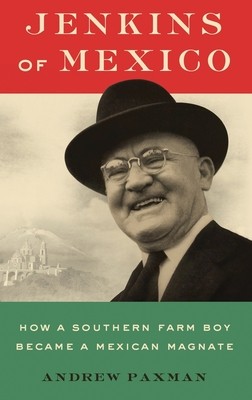
- We will send in 10–14 business days.
- Author: Andrew Paxman
- Publisher: Oxford University Press, USA
- ISBN-10: 0190455748
- ISBN-13: 9780190455743
- Format: 16 x 23.9 x 4.3 cm, hardcover
- Language: English
- SAVE -10% with code: EXTRA
Reviews
Description
In the city of Puebla there lived an American who made himself into the richest man in Mexico. Driven by a steely desire to prove himself-first to his wife's family, then to Mexican elites-William O. Jenkins rose from humble origins in Tennessee to build a business empire in a country energized by industrialization and revolutionary change. In Jenkins of Mexico, Andrew Paxman presents the first biography of this larger-than-life personality.
When the decade-long Mexican Revolution broke out in 1910, Jenkins preyed on patrician property owners and bought up substantial real estate. He suffered a scare with a firing squad and then a kidnapping by rebels, an episode that almost triggered a US invasion. After the war he owned textile mills, developed Mexico's most productive sugar plantation, and helped finance the rise of a major political family, the Ãvila Camachos. During the Golden Age of Mexican cinema in the 1940s-50s, he lorded over the film industry with his movie theater monopoly and key role in production. By means of Mexico's first major hostile takeover, he bought the country's second-largest bank. Reputed as an exploiter of workers, a puppet-master of politicians, and Mexico's wealthiest industrialist, Jenkins was the gringo that Mexicans loved to loathe. After his wife's death, he embraced philanthropy and willed his entire fortune to a foundation named for her, which co-founded two prestigious universities andfunded projects to improve the lives of the poor in his adopted country. Using interviews with Jenkins' descendants, family papers, and archives in Puebla, Mexico City, Los Angeles, and Washington, Jenkins of Mexico tells a contradictory tale of entrepreneurship and monopoly, fearless individualism and cozy deals with power-brokers, embrace of US-style capitalism and political anti-Americanism, and Mexico's transformation from semi-feudal society to emerging economic power.
EXTRA 10 % discount with code: EXTRA
The promotion ends in 19d.05:45:18
The discount code is valid when purchasing from 10 €. Discounts do not stack.
- Author: Andrew Paxman
- Publisher: Oxford University Press, USA
- ISBN-10: 0190455748
- ISBN-13: 9780190455743
- Format: 16 x 23.9 x 4.3 cm, hardcover
- Language: English English
In the city of Puebla there lived an American who made himself into the richest man in Mexico. Driven by a steely desire to prove himself-first to his wife's family, then to Mexican elites-William O. Jenkins rose from humble origins in Tennessee to build a business empire in a country energized by industrialization and revolutionary change. In Jenkins of Mexico, Andrew Paxman presents the first biography of this larger-than-life personality.
When the decade-long Mexican Revolution broke out in 1910, Jenkins preyed on patrician property owners and bought up substantial real estate. He suffered a scare with a firing squad and then a kidnapping by rebels, an episode that almost triggered a US invasion. After the war he owned textile mills, developed Mexico's most productive sugar plantation, and helped finance the rise of a major political family, the Ãvila Camachos. During the Golden Age of Mexican cinema in the 1940s-50s, he lorded over the film industry with his movie theater monopoly and key role in production. By means of Mexico's first major hostile takeover, he bought the country's second-largest bank. Reputed as an exploiter of workers, a puppet-master of politicians, and Mexico's wealthiest industrialist, Jenkins was the gringo that Mexicans loved to loathe. After his wife's death, he embraced philanthropy and willed his entire fortune to a foundation named for her, which co-founded two prestigious universities andfunded projects to improve the lives of the poor in his adopted country. Using interviews with Jenkins' descendants, family papers, and archives in Puebla, Mexico City, Los Angeles, and Washington, Jenkins of Mexico tells a contradictory tale of entrepreneurship and monopoly, fearless individualism and cozy deals with power-brokers, embrace of US-style capitalism and political anti-Americanism, and Mexico's transformation from semi-feudal society to emerging economic power.


Reviews